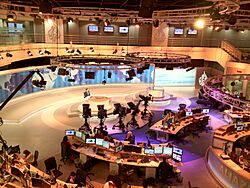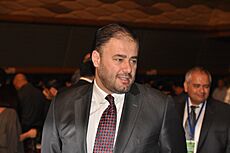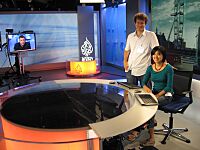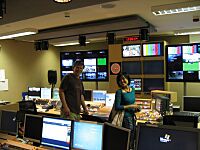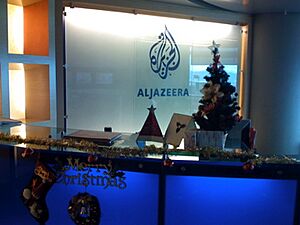Al Jazeera Media Network facts for kids
 |
|
|
Native name
|
الجزيرة
|
|---|---|
|
Formerly
|
Al Jazeera Satellite Network |
| Statutory private foundation for public benefit | |
| Industry | Mass media |
| Founded | 1 November 1996 |
| Founder | Sheikh Hamad ibn Khalifa Al Thani |
| Headquarters | Qatar Radio and Television Corporation Complex,
Doha, Ad-Dawhah
,
Qatar
|
|
Area served
|
Worldwide |
|
Key people
|
|
| Products | Cable network programming, direct-broadcast satellite, television, new media, multicultural education |
|
Number of employees
|
3,000 |
| Subsidiaries | Al Jazeera Arabic Al Jazeera English Al Jazeera Mubasher Al Jazeera Balkans Al Jazeera Türk Al Jazeera Documentary Channel AJ+ Aljazeera.com Al Jazeera Podcasts Rightly Al Jazeera Center for Studies Al Jazeera International Documentary Film Festival Al Jazeera Balkans Documentary Film Festival |
Al Jazeera Media Network (AJMN; Arabic: الجزيرة Al-Jazīrah [æl (d)ʒæˈziːrɐ], lit. The Peninsula) is a private-media conglomerate headquartered at Wadi Al Sail, Doha, funded in part by the government of Qatar. The network's flagship channels include Al Jazeera Arabic and Al Jazeera English, which provide coverage of regional and international news, along with analysis, documentaries, and talk shows. In addition to its television channels, Al Jazeera has expanded its digital presence with platforms such as AJ+, catering to younger audiences with formats and content tailored for online consumption. Al Jazeera broadcasts in over 150 countries and territories, and has a large global audience of over 430 million people.
Originally conceived as a satellite TV channel delivering Arabic news and current affairs, it has since evolved into a multifaceted media network encompassing various platforms such as online, specialized television channels in numerous languages, and more. The network's news operation currently has 70 bureaus around the world that are shared between the network's channels and operations, making it one of the largest collections of bureaus among media companies globally.
While AJMN receives public funding from the Qatar government, it is considered a private company, not a government station. Despite allegations that the government of Qatar has editorial influence over its content, AJMN maintains that its reporting is not influenced or directed by the Qatari government, and it does not reflect any official government viewpoints. The network has often been targeted by foreign governments that are angered by its coverage. During the Qatar diplomatic crisis, several Arab countries severed diplomatic ties with Qatar and imposed a blockade. One of their demands was the closure of Al Jazeera. Other media networks have spoken out in support of the network.
History
Launch
The original Al Jazeera Satellite Channel (then called JSC or Jazeera Satellite Channel) was launched on 1 November 1996. This was following the closure of the first BBC Arabic language television station, then a joint venture with Orbit Communications Company, owned by Saudi King Fahd's cousin, Khalid bin Faisal Al Saud. The BBC channel had closed after a year and a half when the Saudi government attempted to thwart a documentary pertaining to executions under sharia law.
The Emir of Qatar, Sheikh Hamad bin Khalifa, provided a loan of QAR 500 million ($137 million) to sustain Al Jazeera through its first five years, as Hugh Miles detailed in his book Al Jazeera: The Inside Story of the Arab News Channel That Is Challenging the West.
Al Jazeera's first day on air was 1 November 1996. It offered 6-hours of programming per day which would increase to 12 hours by the end of 1997. It was broadcast to the immediate neighborhood as a terrestrial signal, and on cable, as well as through satellites (which was also free to users in the Arab world). 1 January 1999 was Al Jazeera's first day of 24-hour broadcasting. Employment had more than tripled in one year to 500 employees, and the agency had bureaus at a dozen sites as far as EU and Russia. Its annual budget was estimated at $25 million at the time.
Al Jazeera English
In 2001, Al Jazeera stood as the sole international news network broadcasting from Kabul, Afghanistan. Following the events of 9/11, there was a notable surge in demand for an English-language version of Al Jazeera. Consequently, the network began considering the establishment of an English-language service.
In late 2002, the director of marketing of Al Jazeera, Ali Mohamed Kama began to push a "repositioning" of Al Jazeera, "accompanied by the introduction of English subtitles and dubbing of broadcast into English."
In 2003, Al Jazeera hired its first English-language journalists, among whom was Afshin Rattansi, from the BBC's Today Programme.
In March 2003, it launched an English-language website (see below). The name of the website was "Al Jazeera Net"; it was launched by younger journalists. The site published various stories covered by the network, but it was not depending on Arabic-language channels and websites. The website aimed to connect to the Western audience, cooperate with BBC, and be "a global citizen's home page."
However, twelve hours after the launch of the website, "Al Jazeera Net" was kept offline due to many denial of service attacks. Over twenty-four hours later, "Al Jazeera Net" came back online however, Freedom Cyber Force Militia hacked the website to redirect web browsers to a picture of the American flag with a slogan saying that "Let Freedom Ring". "Al Jazeera Net" was then unable to be securely hosted because three of Al Jazeera's web providers, Horizons Media, Information Services, and Akamai Technologies canceled the contract. Also in March, Yahoo and AOL stopped advertising contracts with Al Jazeera. Therefore, the English-translated website was put off later in 2003.
On 4 July 2005 Al Jazeera officially announced plans to launch a new English-language satellite service to be called Al Jazeera International. The new channel started at 12h GMT on 15 November 2006 under the name Al Jazeera English and lanuched with broadcast centers in Doha (next to the original Al Jazeera headquarters and broadcast center), London, Kuala Lumpur and Washington D.C. Initially, 12 hours of news a day were broadcast from Doha, and the rest of the day's output was split equally between London, Kuala Lumpur, and Washington D.C. Among its staff were journalists hired from ABC's Nightline and other top news outfits. Josh Rushing, a former media handler for CENTCOM during the Iraq war, agreed to provide commentary; David Frost was also on board.
The new English language venture faced considerable regulatory and commercial hurdles in the North America market for its perceived sympathy with extremist causes. The channel eventually secured carriage on a small number of cable systems in the United States, including one in Washington, D.C.
Al Jazeera Balkans
In 2011 Al Jazeera Media Network created Al Jazeera Balkans, a version of Al Jazeera in the Bosnian/Croatian/Serbian language(s) stationed in Sarajevo, Bosnia and Herzegovina catering to and broadcasting around the Balkans.
Al Jazeera Turk
In February 2011, the Savings Deposit Insurance Fund of Turkey put Cine5 up for sale after the channel was confiscated when the owner Erol Aksoy went in debt and became bankrupt. Al Jazeera made a bid for the network and acquired it for $40.5 million after an unsuccessful $21 million bid. Al Jazeera then renamed the channel and worked on launching a Turkish language Al Jazeera operation.
In April 2012, there were reports of the channel being delayed over its refusal to call the Kurdistan Workers Party as "terrorists" as most Turkish news outlets do, citing journalistic standards. The Foreign Ministry, who advocated the project, became at odds with the channel. Vural Ak, a major Turkish investor, withdrew from the partnership with Al Jazeera. Nuh Yilmaz, head of Al Jazeera's Turkish editorial team, also resigned.
In 2013 they announced the creation of Al Jazeera Türk, a version of Al Jazeera in the Turkish language(s), stationed in Istanbul, and catering to and broadcasting around Turkey. On January 22, 2014, Al Jazeera Türk's website was launched with news content. The move made Al Jazeera Türk the first 24-hour news operation to go digital before broadcast. The channel was under construction with plans to launch towards the end of 2014. Construction and indoor works were underway at the upcoming channel's building in Topkapı, İstanbul. The website shut down in 2017 without the channel being launched.
Al Jazeera America
Al Jazeera America was an American version of Al Jazeera English. The channel launched on 20 August 2013 exclusively on cable and satellite systems in the United States.
On 2 January 2013, Al Jazeera Media Network announced that it purchased Current TV from its founders Al Gore, Joel Hyatt, and Ronald Burkle, in the United States and would be launching an American news channel. Originally 60% of the channel's programming would be produced in America while 40% would be from Al Jazeera English, which later changed to almost all the content being U.S. originated.
Though Current TV had large distribution throughout the United States on cable and satellite TV, it averaged only 28,000 viewers at any time. The acquisition of Current TV by Al Jazeera allowed Time Warner Cable to drop the network due to its low ratings, but released a statement saying that they would consider carrying the channel after they evaluated whether it made sense for their customers. The channel was later added to Time Warner and Bright House Networks lineups after a new carriage deal was agreed upon.
On January 13, 2016, Al Jazeera America CEO Al Anstey announced that the network would cease operations on April 12, 2016, citing the "economic landscape".
AJ+
Al Jazeera Media Network also has a digital online-only news channel AJ+. The channel is an online and mobile-only news channel primarily found on various social media networks and YouTube and operated by Al Jazeera New Media out of San Francisco, California. The channel consists of mostly On Demand content. It soft-launched on 13 June 2014 with a new webpage, Facebook page and videos on YouTube. The full channel launched with an app in September 2014. There are also Arabic and Spanish language versions of the channel.
Al Jazeera Sports
In 2004 Al Jazeera expanded into the world of sports with the establishment of Al Jazeera Sports (now known as beIN Sports) and the building of 8 Arabic language specialty sports channels.
On 1 January 2014, Al Jazeera Sports was renamed beIN Sports after it along with all of the organisation's non-news and current affairs assets were spun off and privatised into beIN Media Group; the channels were legally spun off to have consistency with all the Network's sports properties. According to Kate O'Brian, President of Al Jazeera America, Al Jazeera Sports revenue helped fund the network when it was in operation similar to how BBC Worldwide helps fund the BBC.
JeemTV and Baraem
On September 9, 2005, Al Jazeera established a children's division with the launch of Al Jazeera Children's Channel (since 2013 it was known as JeemTV). The channel targets an audience of 7 to 15-year-olds and broadcasts 24 hours a day.
On January 16, 2009, Baraem launched, the channel targets an audience of three to seven-year-olds and broadcasts 17 hours a day (6 am to 11 pm Doha time).
On April 1, 2016, both JeemTV and Baraem were acquired by beIN Media Group and were made part of beIN Channels Network. Since then, as a result, the channels were no longer free to view and made exclusive to beIN Channels Network.
Other channels
Al Jazeera Media Network also operates Al Jazeera Documentary Channel an Arabic language documentary channel, Al Jazeera Mubasher, a live politics and public interest channel (similar to C-SPAN, Houses of the Oireachtas Channel or BBC Parliament), which broadcasts conferences in real time without editing or commentary, the first channel of its kind in the Middle East.
Restructuring
Al Jazeera restructured its operations to form a network that contains all their different channels. Wadah Khanfar, then the managing director of the Arabic Channel, was appointed as the Director-General of the Al Jazeera Network. He also acted as the managing director of the Arabic channel. Khanfar resigned on 20 September 2011, proclaiming that he had achieved his original goals and that eight years was enough time for any leader of an organization, in an interview aired on Aljazeera English.
On 26 November 2009, Al Jazeera English received approval from the CRTC, which enables Al Jazeera English to broadcast via satellite in Canada.
In 2011, in accordance with the renaming of the corporation, Al Jazeera Media Network was legally re-designated from a "public institution to a 'private institution of public utility'"; however, it was unknown how this would affect editorial management and funding. The network is also funded through its television contracts and revenue from its sports division.
Al Jazeera and the 2011 Arab Spring
Al Jazeera covered the Arab spring more than any other news outlets and had a significant role in spreading the Arab uprising. Al Jazeera was the leading media spreading the news about unrest in a small city in Tunisia throughout the Middle East in 2011.
People in the Middle East have heavily relied on Al Jazeera to obtain news about their regions and the world even more than YouTube and Google. Hillary Clinton, who at the time of the Arab Spring was the U.S. Secretary of State stated that "Al-Jazeera has been the leader in that [it is] literally changing people’s minds and attitudes. And like it or hate it, it is really effective."
The news of unrest in the Arab states was broadcast by Al Jazeera in Arabic for the Arab world as well as in English for the audiences from the rest of the world.
In Tunisia, the Ben Ali regime banned Al Jazeera from operating in the country, but with the help of Facebook users inside Tunisia, Al Jazeera was able to access reports from the events such as protests and government crackdowns that were taking place inside the country. The intensive media coverage of people's uprising against their leaders by Al Jazeera mobilized more people from other parts of the country to join the revolution.
The population in other Arab countries such as Bahrain, Egypt, Yemen, Libya, Syria also mobilized against their governments influenced by the Tunisian's successful revolt which was extensively covered by Al Jazeera in local languages. The international opinion also came to support the Arab movements in the Middle East since Al Jazeera English covered and reported governmental human right abuses against political activists and even ordinary citizens in the Middle East.
Subsidiaries
Television
Al Jazeera media network operates a number of specialty channels besides its original flagship news channel.
Al Jazeera network's TV channels include and included:
| Channel | Description | Launched in |
|---|---|---|
| Al Jazeera Arabic | the original international Arabic-language 24h news channel | 1 November 1996 |
| Al Jazeera English | a global English-language 24h news channel | 2006 |
| Al Jazeera Balkans | a version of Al Jazeera in the Bosnian/Croatian/Serbian language(s) stationed in Sarajevo, Bosnia and Herzegovina catering to and broadcasting around the Balkans | 2011 |
| Al Jazeera Mubasher (a.k.a. Al Jazeera Live General) | a live politics and public interest channel (similar to C-SPAN, Houses of the Oireachtas Channel or BBC Parliament), which broadcasts conferences in real time without editing or commentary | 2005 |
| Al Jazeera Documentary Channel | an Arabic language documentary channel | 2007 |
| Other Entities | Description | Year |
| AJ+ | an online news channel that promotes the different thinking of other cultures and understanding of news in a first-person perspective. | 2014 |
| Al Jazeera Podcasts | a podcast network | 2017 |
| Rightly | an online news channel aimed at center-right American conservatives. | 2021 |
| Al Jazeera Training Center | an Arabic language, Graphics and Media Training Center | 2004 |
| Al Jazeera Center for Studies | a Think Tank that conducts research and in-depth analysis of current affairs at both regional and global levels | 2006 |
| Discontinued Channels | Description and Region | Time Period |
| Al Jazeera America | intended to compete with other news channels, including CNN, HLN, MSNBC, FOX, and RT in the United States | August 20, 2013 – April 12, 2016 |
| Al Jazeera Mubasher Misr | a version of Al Jazeera Mabasher for Egypt, Shutdown and merged into Al Jazeera Mabasher. | 2011–2013 |
| Al Jazeera Urdu | an Urdu language version of Al Jazeera intended for Pakistan. Never began transmission. | 2006 |
| Al Jazeera Türk | a planned version of Al Jazeera in the Turkish language(s) stationed in Istanbul catering to and broadcasting around Turkey. Only online operations commenced. | 2014–2017 (Never completed) |
| Al Jazeera Kiswahili | Kiswahili version of Al Jazeera to be based in East Africa. | 2011–2012 (Never completed) |
| Disbanded Channels | Description | Time Period |
| JeemTV | a children's interest channel. It used to be called Al Jaweera Children's Channel until it was renamed to JeemTV in 2013. Sold to beIN Channels Network on April 1, 2016. | September 9, 2005 - April 1, 2016 |
| Baraem | a pre-school Arabic TV channel. Sold to beIN Channels Network on April 1, 2016. | January 16, 2009 - April 1, 2016 |
Other operations
Online
The network operates Aljazeera.com which is the main website for the Al Jazeera English, Al Jazeera Balkans and the former Al Jazeera America web sites. For its Arabic language properties, it has Aljazeera.net. and for its Turkish properties Aljazeera.tr.
On January 1, 2018, Al Jazeera launched a Mandarin-language news website becoming the first Middle Eastern news provider to target the Chinese audience. The staff of the project is in contact with their audience via Chinese social media like Weibo, Meipai and WeChat.
Al Jazeera Podcasts
In 2017, the network launched a podcasting network called Jetty. Later renamed Al Jazeera Podcasts, the network is available via the network's website as well as SoundCloud, Apple Podcasts, Stitcher, TuneIn, and iHeartRadio. The network is based out of San Francisco alongside AJ+ and is available in English. Jetty debuted with the podcast Closer Than They Appear, a hybrid interview/narrative show hosted by writer Carvell Wallace. Other podcasts that debuted in 2018 included The Game of Our Lives which uses soccer to explain global economics and cultures, a podcast on freedom dubbed (Freedom Stories, featuring Melissa Harris-Perry), and global music (Movement) with Meklit Hadero.
Rightly
In 2021, the network launched Rightly, an online news channel aimed at center-right American conservatives. The channel much like AJ+ is only available online, primarily on YouTube. The launch of the channel spurred questions from Al Jazeera staff questioning if the channel took away from Al Jazeera's mission to be non-partisan and from various media critics wondering if conservative audiences would watch a channel from Al Jazeera, a long time target of American conservatives.
Al Jazeera Center for Studies
Al Jazeera Media Network owns and operates the Al Jazeera Center for Studies. Established in 2006, the Al Jazeera Center for Studies conducts in-depth analysis of current affairs at both regional and global levels. Its research agenda focuses primarily on geopolitics and strategic developments in the Arab world and surrounding regions. The center with an extensive network of distinguished researchers, and a wide range array of experts from across the globe, the center aims to promote dialogue and build bridges of mutual understanding and cooperation between cultures, civilizations, and religions. The center also contains the Al Jazeera Media Training and Development Center.
Al Jazeera International Documentary Film Festival
The Al Jazeera International Documentary Film Festival is an annual film festival held at the Doha Sheraton in Doha, Qatar. The first festival was held on 18 April 2005. Every year the festival has a different theme.
The Al Jazeera Balkans Documentary Film Festival was started in 2018 as an annual international documentary film festival based in Sarajevo, Bosnia and Herzegovina.
See also
- Al Jazeera controversies and criticism
- Al Jazeera effect
- Al Araby (TV channel)
- Middle East Eye
- The New Arab


